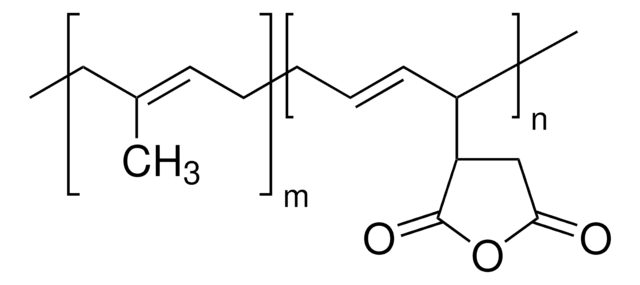531367
Poly[(isobutylene-alt-maleic acid, ammonium salt)-co-(isobutylene-alt-maleic anhydride)]
average Mw ~60,000
Synonym(s):
maleated copolymer, maleated polymer, maleic copolymer
Sign Into View Organizational & Contract Pricing
All Photos(2)
About This Item
Linear Formula:
(C4H2O3 · C4H8)m · xH3N
CAS Number:
MDL number:
UNSPSC Code:
12162002
NACRES:
NA.23
Recommended Products
mol wt
average Mw ~60,000
Quality Level
pH
7.0 (5% in H2O)
viscosity
10.3 cP, 0.5 % in H2O(25 °C)(lit.)
solubility
H2O: soluble
density
1.3 g/mL at 25 °C (lit.)
Looking for similar products? Visit Product Comparison Guide
Related Categories
General description
Poly[(isobutylene-alt-maleic acid, ammonium salt)-co-(isobutylene-alt-maleic anhydride)] (PIM) is a water soluble polymer.
Application
Binder for ceramic powders and dispersing agent for water soluble paints.
PIM may be used to prepare montmorillonite (MMT) clay and amylopectin-based nanocomposites. PIM may be used as a dispersant for the preparation of NiO/Y3O3-ZrO2 for solid oxide fuel cells (SOFCs). PIM may also find use as a coupling agent.Binder for ceramic powders and dispersing agent for water soluble paints.
Storage Class Code
11 - Combustible Solids
WGK
WGK 3
Flash Point(F)
Not applicable
Flash Point(C)
Not applicable
Certificates of Analysis (COA)
Search for Certificates of Analysis (COA) by entering the products Lot/Batch Number. Lot and Batch Numbers can be found on a product’s label following the words ‘Lot’ or ‘Batch’.
Already Own This Product?
Find documentation for the products that you have recently purchased in the Document Library.
Cornelia Vasile & Gennadii Efremovich Zaikov
Environmentally Degradable Materials Based on Multicomponent Polymeric Systems null
Starch Nanocomposites with Platelet and Fibrillar Fillers.
Nordqvist D, et al.
Journal of Biobased Materials and Bioenergy, 3(2), 139-146 (2009)
M C Bonferoni et al.
Drug development and industrial pharmacy, 34(11), 1188-1195 (2008-08-23)
The interaction between polyelectrolytes (PE) and oppositely charged drugs (D) results in complexes (PE-D) that can be exploited in controlled release drug delivery systems. The aim of this work is to better understand the relevance of some preparative parameters such
Hyukjin Lee et al.
Biomacromolecules, 8(12), 3705-3711 (2007-11-13)
Shell cross-linked hollow polyelectrolyte microcapsules composed of hyaluronic acid (HA) and poly- l-lysine (PLL) were prepared by layer-by-layer (LBL) adsorption and subsequent core removal by a reductive agent. Disulfide cross-linked HA microgels were used as template core materials for the
R D Jayant et al.
Drug delivery, 16(6), 331-340 (2009-07-18)
Alginate microspheres loaded with dexamethasone were prepared by the droplet generator technique. Important parameters affecting drug release, including initial drug content, the type of polyelectrolyte coating, and a combination of different ratios of coated and uncoated microspheres were investigated to
Our team of scientists has experience in all areas of research including Life Science, Material Science, Chemical Synthesis, Chromatography, Analytical and many others.
Contact Technical Service







